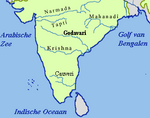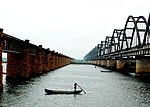| This article needs additional citations for verification. Please help improve this article by adding citations to reliable sources. Unsourced material may be challenged and removed. Find sources: "Manjira River" – news · newspapers · books · scholar · JSTOR (August 2023) (Learn how and when to remove this message) |
| Manjara River | |
|---|---|
 Manjara rivercourse (top) Manjara rivercourse (top) | |
| Location | |
| Country | India |
| State | Maharashtra, Karnataka, Telangana |
| Physical characteristics | |
| Source | |
| • location | Maharashtra, India |
| Mouth | Godavari River |
| • location | Sangam, Maharashtra, India |
| Length | 724 km (450 mi) |
| Basin size | 30,844 km (11,909 sq mi) |
| Discharge | |
| • location | Sangam |
The Manjara river (also spelled Manjara (in Maharashtra), or Manjeera) is a tributary of the river Godavari. It passes through the states of Maharashtra, Karnataka and Telangana. It originates in the Balaghat range of hills near the Ahmednagar district at an altitude of 823 metres (2,700 ft) and empties into the Godavari River. It has a total catchment area of 30,844 square kilometres (3,084,400 ha). This river is one of the Triveni Sangam.
Description
The river's origin is near the Gavalwadi village of the Beed district. The river flows from the northern boundaries of the Osmanabad district, cutting across the Latur district, goes to the Bidar district and finally Telangana. It flows on the Balaghat plateau along with its tributaries: Terna, Tawarja and Gharni. The other three tributaries of Manjara are Manyad, Teru and Lendi which flow on the northern plains.
The final stretch of the river forms the border between Maharashtra (west) and Telangana (east). Manjira, along with the Haridra River, merges with Godavari River at the border.
Tributaries
- Terna River: This is the main tributary of Manjara, which flows on the southern boundary of the Ausa Taluka.
- Manyad: This river has its origin at Dharmapuri, and flows through the Ahmadpur Talukat.
- Lendi: This river has its origin in Udgir Taluka, and flows through the Ahmadpur Taluka, joining the Tiru river in Nanded district.
- Gharni: This river has its origin near Wadval and flows through Chakur Taluka.
- Tawarja: This river has its origin near Murud in Latur Taluka, and joins the Manjara river at Shivani on the Latur-Ausa boundary.
Environment
In the late 20th and early 21st centuries, the upper reaches of the Manjira in Maharashtra suffered environmental degradation, which increased runoff, as opposed to groundwater recharge, and increased erosion and silting.
References
- "River Systems Of Karnataka". Irrigation Dept. of Karnataka. Archived from the original on 16 July 2012. Retrieved 19 August 2023.
- "District Profile". Latur District Official Website. Archived from the original on 30 March 2018. Retrieved 19 August 2023.
- "In dry Latur, villagers revive a dead river". The Times of India. 10 May 2016. Archived from the original on 12 May 2016. Retrieved 19 August 2023.
- "Latur Drinking Water Crisis highlights absence of Water Allocation Policy and Management". South Asia Network on Dams, Rivers and People. 20 April 2016.
- Gokhale, Nihar (8 September 2015). "Water supply once a month: lessons to be learnt from Latur". Catch News (Rajasthan Patrika Group). Archived from the original on 11 September 2015. Retrieved 19 August 2023.
| Hydrography of Telangana | |
|---|---|
| Rivers | |
| Waterfalls | |
| Lakes | |
| Dams | |
19°55′48″N 73°31′39″E / 19.9300°N 73.5275°E / 19.9300; 73.5275
Categories:


